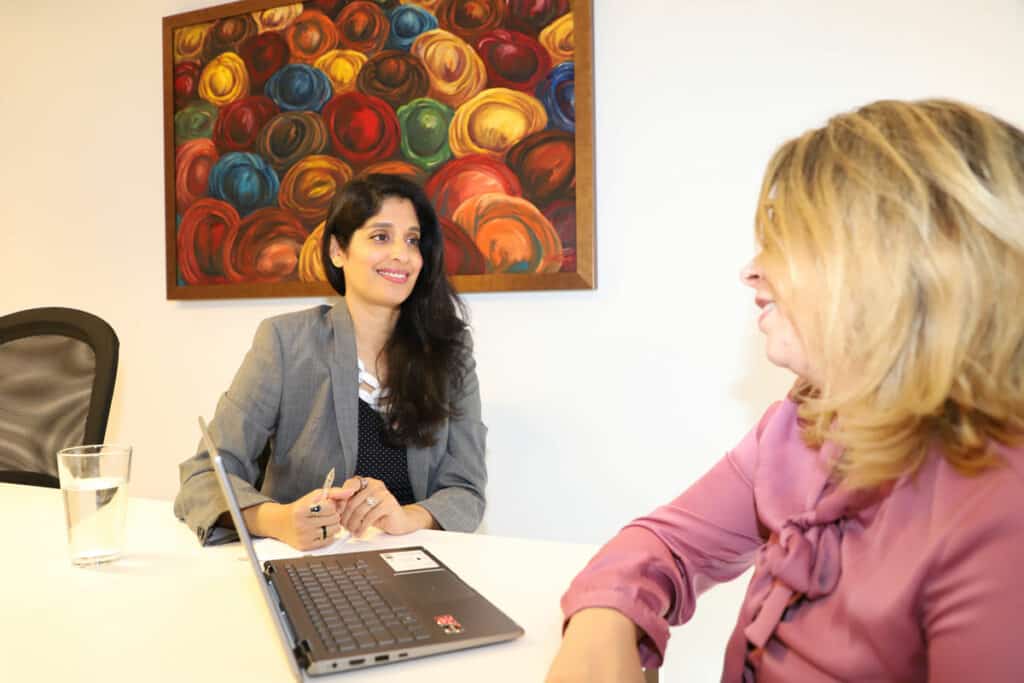
I’ve been thinking a lot about psychological safety lately.
This is partly because July was BIPOC Mental Health Awareness Month and we’ve been delivering a range of mental health sessions, including more psychological safety programming. But it’s also because the world continues to feel very heavy right now. Many of us want to talk more openly about how hard life is in the context of both our personal lives and our work.
In this moment, we’re witnessing daily traumatic events — from mass shootings to wars to racist attacks to the limiting of women’s and LGBTQ+ rights. On top of that, we’re attempting to navigate a continued pandemic work world where we’re grappling with navigating hybrid arrangements. Many employees wish they could openly share what they’re thinking and feeling, but they just don’t feel safe doing so.
What is Psychological Safety?
At bci, we use the following definition of psychological safety, developed by our Mental Health Expert-in-Residence, Dr. Komal Bhasin: psychological safety is the belief that members of a team can express ideas and concerns, ask questions, interact freely and exercise personal and collective agency without fear of experiencing punishment, retaliation, exclusion and inequities. Psychological safety is about trusting our leaders, feeling comfortable sharing dissenting views knowing that we’ll be accepted and having the ability to be our Authentic Selves at work.
Given all the change, stress and transition of this moment, it’s critical that organizations prioritize fostering psychological safety. And this is especially true as it relates to cultivating respect and inclusion for professionals from equity-seeking communities.
So what can you do to make this happen? Here are four ways to cultivate psychological safety whether you’re working virtually, in person or in a hybrid environment.
By creating a workplace that is psychologically safe, organizations empower their employees to experience agency, autonomy and empowerment, while also feeling supported in a way that enables them to do their best work.
And this is everything when it comes to inclusion.
Sign up for bci’s mailing list to get the latest diversity, equity and inclusion insights right to your inbox every month.
Komal is bci’s Senior DEI Consultant and Mental Health Expert-in-Residence and an accomplished DEI facilitator, coach, and strategist. Komal has over 20 years of experience in providing strategic and advisory guidance and program development across a range of sectors, with a particular concentration in mental health and racial inclusion. Komal is also the founder of Insayva Inc., a social enterprise focused on providing accessible DEI and health equity support to charities and non-profit organizations.
Komal has extensive experience in creating and delivering programming in a range of leadership and DEI areas, including mental health inclusion, psychological safety, empathy, relationship repair, allyship, and cultural competence. She is passionate about driving transformational change in workplaces and has worked closely with bci clients – corporations, professional service firms, health care providers, and educational institutions – to embed cultures of inclusion within their organizations.
Komal has provided one-on-one inclusion coaching to hundreds of senior leaders and brings a unique approach that is informed by her background as a therapist. She is able to expertly handle sensitive conversations and situations and works with leaders to develop the knowledge and skills necessary to advance racial/ethnocultural, gender, and mental health-related equity across teams and organizations. Komal also offers a performance coaching program designed specifically for BIPOC leaders. This program aims to help BIPOC leaders harness their place, position, and identity to thrive in the workplace and beyond. Komal is a qualified administrator of the Intercultural Development Inventory (IDI).
As bci’s Mental Health Expert-in-Residence, Komal offers tremendous expertise around workplace mental health. As a doctoral trained mental health clinician, certified health executive, and registered social worker, Komal has assisted organizations looking to advance employee mental health inclusion and well-being through offering programming on inclusive dialogue, anti-stigma, burnout prevention, psychological safety, resilience, and self-care. Komal is committed to advancing mental health and wellness across the life course; she currently serves on the board of the Alzheimer’s Society of Ontario and previously served on the boards of Children’s Mental Health Ontario and the YMCA of Greater Toronto.
When Komal is not working, you’ll find her painting, cooking, or snuggling with her cats.